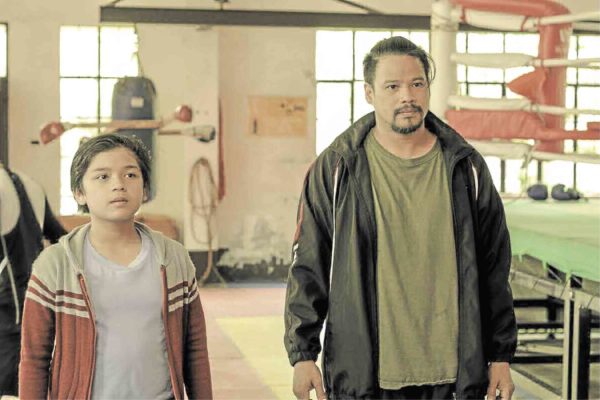
Sharon Cuneta in “Ang Pamilyang Hindi Lumuluha”
You know something is amiss when you watch five consecutive Cinemalaya entries, and each of them ends up becoming a painful viewing experience. No, they aren’t just mediocre—they’re either contrived, predictable or migraine-inducing for their astonishing lapses in craft and logic. An “all-time low,” as a friend and colleague succinctly noted.
That was how our moviegoing marathon unraveled last weekend. And the fact that those films were being fielded by the country’s premier indie festival—responsible for such delectable cinematic gems as “Quick Change,” “Mariquina,” “Bwakaw” and “Pamilya Ordinaryo”—was quite troubling.
We’ve always championed Cinemalaya’s cause since its auspicious start in 2005, but blind patronage has never been our cup of tea. The big question is, who dropped the ball?
When the dust finally settled, we could recommend only three of the festival’s nine official entries in the full-length feature category: Alberto Monteras II’s “Respeto,” Mes de Guzman’s “Ang Pamilyang Hindi Lumuluha” and Thop Nazareno’s “Kiko Boksingero.”
Using the country’s disheartening human-rights situation to frame its tale, “Respeto” examines the unlikely bond forged between amateur rapper Hendrix (Abra) and martial law poet “Doc” Fortunato Reyes (Dido dela Paz), who find comfort in their shared love for spoken word.
As entertaining as it is thematically pertinent, Monteras’ urgently paced film blurs the line between poetry and rap music with insightful boldness. But the movie, Cinemalaya’s most significant entry this year, wouldn’t have been as convincing without the award-worthy turns of the charismatic Abra and Dela Paz. Similarly outstanding are supporting actors Chai Fonacier, Loonie and the sinister Nor Domingo.
At 76 minutes, the bittersweet coming-of-age drama “Kiko Boksingero” is the fest’s shortest and most poignant film: When his mother passes away, 11-year-old Kiko (Noel Comia Jr.) is left to the care of his doting nanny (Yayo Aguila).

Noel Comia Jr. (left) and Yul Servo in “Kiko Boksingero”
Kiko’s humdrum existence gets a shot of adrenaline when he crosses paths with retired boxer George (Yul Servo)—who happens to be his estranged father. But, it is the boy’s relationship with his yaya where the film finds its heart.
With its no-frills storytelling style, the movie cleverly does away with distracting narrative side trips. But, its brevity is also its own limitation, because it leaves not much room for character development or backstories that could have made its story richer, fuller and more empathetic.
Lending understated charm to their roles are Comia and Aguila, who vivify a heartwarming relationship that persuasively demonstrates why people don’t have to be blood relatives to genuinely care for each other.
Completing the film’s thespic tag team is Servo, who limns the fascinating contradictions of his appealing but flawed character with uncomplicated grace.
Also devoid of unnecessary convolutions is Mes de Guzman’s “Ang Pamilyang Hindi Lumuluha,” which is as much a showcase for the director’s versatility as it is for Sharon Cuneta’s continually maturing and award-worthy “dramedic” chops. The film is De Guzman’s most accessible film to date.
Like “Kiko,” “Pamilya” astutely demonstrates why “less is more.” It doesn’t veer far away from its deceptively simple premise but, as with the rest of De Guzman’s oeuvre (“Diablo,” “Ang Kwento ni Mabuti”), there’s more to it than meets the eye.
Staged with prescient precision and a tantalizing serving of magic realism, “Pamilya” plays out like a fable following the tale of lonely and desperate Cora dela Cruz (Cuneta).
With her kooky maid (the spunky Moi Bien) by her side, Cora seeks out the help of an “investigator” (Niño Muhlach) to find the mythical “Family That Doesn’t Weep”—who, she believes, can bring back the husband, son and daughter who have all abandoned her!
With disarming persuasiveness, the film questions people’s proclivity for relying on others to bring them happiness.
Abra in “Respeto”
It also shows why Sharon deserves to win Cinemalaya’s best actress award—in a role that plays well to her strengths as an actress. Doing comedy may look like a breeze because it doesn’t require showy caterwauling, but executing it well is always a tough thespic roe to hoe.
The Megastar seamlessly juggles the movie’s rollicking moments with the eventual dramatic catharsis that explodes when her character reaches the end of her rope.
“Pamilya” and “Boksingero” prove that a film doesn’t need circuitous detours to tell a fascinating story.
In instructive contrast, Angeli Bayani is consistently transfixing in Zig Dulay’s “Bagahe,” where she’s cast as an overseas worker accused of attempted parricide. But hers is a portrayal we’ve already seen in “Bwaya”—and one that’s weighed down by a frustratingly predictable film.
In it, every scene feels like it’s been set up to give Bayani a “watch-and-learn” opportunity to play the “victim card” to the hilt—which eventually feels disingenuous and exhausting.
To be honest, we were looking forward to watching “Bagahe” because, while 2011’s “Huling Halik” was wince-worthy for its exploitative theme and tone, Dulay’s follow-ups (“Paglipay,” “Bambanti”) were proficiently helmed dramas.
Sadly, “Bagahe” struggles to find its feet as it repurposes tragedy to excuse its clichés. So, what happened?
For its part, Nerissa Picadizo’s romantic travelogue, “Requited,” generates more fizzle than sparks. It is compromised further by a silly twist.
In the movie, ailing biker Matt (the intense Jake Cuenca) embarks on his “final adventure” to Mt. Pinatubo, with Sandy (Anna Luna, who’s grossly miscast) in tow.
As “friends” who can’t seem to stop bickering long enough to realize their abiding love for each other, Matt and Sandy prefer to complicate an otherwise uncomplicated situation.
Joseph Israel Laban’s “Baconaua” is as problematic for its soporific, meandering development as it is for its cast’s knee-jerk characterizations.
As it shows how the residents of a fishing village react to an “astonishing sight of a sea that has turned red,” the movie for much of its running time (at Greenbelt) is too dark to appreciate—which is a big no-no in a visual medium like film. But, the languorous story itself doesn’t amount to much because of its stodgy execution.
In the case of Iar Lionel Arondaing’s “Sa Gabing Nananahimik ang mga Kuliglig,” its visual inventiveness hardly provides relief for its ponderous exposition and the protagonists’ slowly shifting circumstances.
In fact, it takes distraught Magda (Angel Aquino) and her confessor Father Romi (Jake Macapagal) 15 minutes to “introduce” the movie’s premise as they tattle and prattle about sin, culpability, redemption and the inviolability of the seal of confession.
The movie examines the events surrounding the death of Magda’s best friend, Dolores (Mercedes Cabral). But, even without its moody proselytizing, there are loose ends that need tying up.
When Dolores’ husband (Ricky Davao) is asked about their union, he reveals that they’ve been married for more than 20 years. It makes viewers wonder how old Cabral’s character was when she married Davao—5 years old? It’s illogical lapses like this that hobbles the film’s believability.
Fraught with tedious clichés, Sonny Calvento’s “Nabubulok” has trouble settling into a coherent story.
In it, the unexplained disappearance of a Filipina who’s married to an American expat creates a ruckus in a village. But, the film quickly succumbs to a series of ridiculous events that utilizes frenetic pacing as an excuse for its inability to find a clarifying focus for its story.
As it dramatizes the needlessness of war, Perry Escaño’s advocacy film, “Ang Guro Kong Di Marunong Magbasa,” whisks viewers through a checklist of filmmaking clichés.
It tells how illiterate Aaquil (Alfred Vargas) manages to pass himself off as a teacher in his war-torn community.
The protracted production cooks up a cinematic brew that has everything—melodrama, action, nerve-bursting performances, etc.—except a comprehensible story.
The film means well but, as they say, the road to hell is paved with good intentions.

